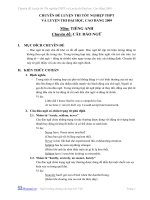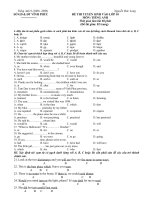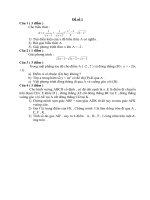- Trang chủ >>
- Nông - Lâm - Ngư >>
- Thú y
De on vao chuyen Anh
Bạn đang xem bản rút gọn của tài liệu. Xem và tải ngay bản đầy đủ của tài liệu tại đây (135.18 KB, 6 trang )
<span class='text_page_counter'>(1)</span><div class='page_container' data-page=1>
<b>SỞ GIÁO DỤC VÀ ĐÀO TẠO PHÚ THỌ</b>
<b>KỲ THI TUYỂN SINH LỚP 10 TRƯỜNG THPT CHUYÊN HÙNG VƯƠNG</b>
<b>Năm học: 2011 - 2012</b>
Môn: TIẾNG ANH (chuyên)
<i>Thời gian làm bài: 120 phút (không kể thời gian giao đề) </i>
<i>Đề thi có: 06 trang </i>
<b>PART I. PHONETICS (1.0 point)</b>
<b>I. Choose the word whose underlined part is pronounced differently from that of the others.</b>
<b>There is an example at the beginning (0). (0.5 pt)</b>
0.
<b>A.</b>
thick
<b>B. </b>
think
<b>C.</b>
they
<b>D.</b>
through
1.
<b>A.</b>
change
<b>B. </b>
hungry
<b>C. </b>
stronger
<b>D.</b>
single
2.
<b>A.</b>
intention
<b>B. </b>
material
<b>C. </b>
mature
<b>D.</b>
intensity
3.
<b>A.</b>
rises
<b>B. </b>
houses
<b>C. </b>
raises
<b>D.</b>
promises
4.
<b>A.</b>
hand
<b>B. </b>
bank
<b>C. </b>
sand
<b>D.</b>
band
5
<b>.</b>
<b>A.</b>
battle
<b>B. </b>
magic
<b>C. </b>
nag
<b>D.</b>
dismayed
<i><b>Your answers:</b></i>
0. C
1.
2.
3.
4.
5.
<b>II. Choose the word whose stress pattern is different from that of the others. There is an</b>
<b>example at the beginning (0). (0.5 pt)</b>
0.
<b> A.</b>
active
<b>B. </b>
section
<b>C</b>
. appoint
<b>D.</b>
happy
1.
<b>A.</b>
national
<b>B. </b>
engineer
<b>C. </b>
interesting
<b>D.</b>
scientist
2.
<b>A.</b>
responsible
<b>B. </b>
environment
<b>C. </b>
importance
<b>D.</b>
residential
3.
<b>A.</b>
provide
<b>B. </b>
combine
<b>C. </b>
service
<b>D.</b>
account
4.
<b>A.</b>
difference
<b>B. </b>
difficult
<b>C. </b>
supporting
<b>D.</b>
beautiful
5.
<b>A.</b>
social
<b>B. </b>
reply
<b>C. </b>
contain
<b>D.</b>
appear
<i><b>Your answers:</b></i>
0. C
1.
2.
3.
4.
5.
<b>PART II. GRAMMAR AND VOCABULARY (4.0 points)</b>
<b>I. Choose the best word or phrase to complete the following sentences. (2.0 pt)</b>
1. ______ is normally used to refer to the treatment and training of the child within the home.
<b>A.</b>
Feeding
<b>B. </b>
Mothering
<b>C. </b>
Upbringing
<b>D.</b>
Educating
2. Several important methods were ______ for preserving food in the nineteenth century.
<b>A.</b>
seen
<b>B. </b>
covered
<b>C. </b>
prepared
<b>D.</b>
invented
3. A man is walking towards me. ______ man is carrying ______ parcel.
<b>A.</b>
A / the
<b>B. </b>
The/ a
<b>C. </b>
Ø/ the
<b>D.</b>
The/ Ø
4. A few years after you buy it, a house is usually ______ much more than it originally costs you.
<b>A.</b>
expensive
<b>B. </b>
worth
<b>C. </b>
worthy
<b>D.</b>
valueless
5. I will do anything but ______ the dishes.
<b>A.</b>
wash
<b>B. </b>
washed
<b>C. </b>
washing
<b>D.</b>
will wash
6. I am so tired that I can't make ______ what you are saying.
<b>A.</b>
up
<b>B</b>
. in
<b>C. </b>
out
<b>D.</b>
on
7. I remember ______ the letter some time ago but I can’t remember exactly when.
<b>A.</b>
to post
<b>B. </b>
posted
<b>C. </b>
posting
<b>D.</b>
post
8. They warned us ______ to the seaside in that month.
<b>A.</b>
to not go
<b>B. </b>
not to go
<b>C. </b>
not to going
<b>D.</b>
not go
9. “I really like your new shoes.” - “And they cost less than I ______.”
</div>
<span class='text_page_counter'>(2)</span><div class='page_container' data-page=2>
10. Those kids are always ______ trouble.
<b>A.</b>
looking up to
<b>B. </b>
getting into
<b>C. </b>
finding about
<b>D.</b>
putting with
11. It is essential that he ______ that contract.
<b>A.</b>
refuse
<b>B. </b>
refuses
<b>C. </b>
refusing
<b>D.</b>
is refusing
12. Either of these buses _______ past the university.
<b>A.</b>
go
<b>B. </b>
goes
<b>C. </b>
have gone
<b>D. </b>
going
13. _______ the flight’s delay, they did not attend the conference.
<b>A.</b>
Because
<b>B. </b>
Although
<b>C. </b>
Because of
<b>D.</b>
As
14. It _______ that many people are homeless after the floods.
<b>A.</b>
were reported
<b>B. </b>
reports
<b>C. </b>
is reported
<b>D. </b>
reporting
15. This shirt is much prettier, but it costs _______ the other one.
<b>A.</b>
so much as
<b>B.</b>
as many as
<b>C. </b>
twice as much as
<b>D.</b>
twice as many
16. Don’t worry about her __________ .
<b>A.</b>
complaintment
<b>B. </b>
complaination
<b>C. </b>
complanation
<b>D. </b>
complaint
17. Please forgive me. I didn’t want ________ you.
<b>A.</b>
to upset
<b>B. </b>
upsetting
<b>C. </b>
to be upset
<b>D.</b>
being upset
18. Vitamin C _______ by the human body, it gets into the blood stream quickly.
<b>A.</b>
absorbs easily
<b>B. </b>
is easily absorbed
<b>C. </b>
is being absorbed easily
<b>D. </b>
absorbed easily
19. What would you like to eat for lunch? - _________, I don’t mind.
<b>A.</b>
Nothing
<b>B. </b>
Something
<b>C.</b>
Every thing
<b>D.</b>
Anything
20. 3/4 means _______ .
<b>A.</b>
third quarters
<b>B. </b>
three quarters
<b>C. </b>
three fourth
<b>D. </b>
thirth fourth
<i><b>Your answers:</b></i>
1.
2.
3.
4.
5.
6.
7.
8.
9.
10.
11.
12.
13.
14.
15.
16.
17.
18.
19.
20.
<b>II. Give the correct form of the words in capital letters. (1.0 pt)</b>
<b>GETTING AHEAD IN BUSINESS</b>
Your chances of success can be greatly increased if you follow a
few simple rules in your working life. First of all, remember that your
(1) _________ wants you to do well- that's what you are being paid for.
Many companies choose (2) __________ young people to work for
them and provide a lot of (3) ___________ for their workers. Working
for a large, international company may provide job (4) ___________.
On the other hand, a smaller company might give you the chance to use
your (5) _____________ more.
Secondly, remember that any experience you gain will always
(6) ___________ your position in the company. The company wants
(7) ___________ that you want to get to the top. Take any opportunity
you get to go on (8) _____________ courses related to your work. The
more (9) ____________ you are, the better chance you have of being
promoted
<b>.</b>
Finally, don't give up, even when you are (10)
____________. Stick with it and you'll get there in the end.
1.
<b>EMPLOY</b>
2.
<b>AMBITION</b>
3.
<b>ENCOURAGE</b>
4.
<b>SECURE</b>
5.
<b>IMAGINE</b>
6.
<b>STRONG</b>
7.
<b>PROVE</b>
8.
<b>TRAIN</b>
9.
<b>QUALIFY</b>
10.
<b>SUCCESS</b>
<i><b>Your answers:</b></i>
1………...
2………
3………
4………....
5……….
</div>
<span class='text_page_counter'>(3)</span><div class='page_container' data-page=3>
<b>III. The passage below contains 10 errors. UNDERLINE and CORRECT them. Write your</b>
<b>answers in the numbered blanks provided. There is an example at the beginning. (1.0 pt)</b>
After an absence in thirty years, I decided
visiting my old school again. I had expected to find changes,
but no a completely different building. As I walked up the school ground,
I wondered for a moment if I had come at the right address.
The grimy, red brick fortress with their tall windows that had
looked up grimly on the playground and playing fields
had swept away. In its place stood a bright, modern block
risen from the ground on great concrete stilts. A huge expanse
of glass extending across the face of the building, and in front,
there was a well-kept lawn where previous there had been
untidy gravel yard
<b>.</b>
0………
<b>for</b>
……….
1………..……
2………..……
3………..……
4………..……
5………..……
6………..……
7………..…
8………..……
9………..……
10………
<b>PART III. READING (3.0 points)</b>
<b>I. Read the passage below and fill each blank with ONE suitable word. (1.0 pt)</b>
Speech is one of the most important (1) _______ of communicating. It consists of far more
than just making noises. To talk and also to be (2) ____________ by other people, we have to speak
a language, that is, we have to use combinations of (3) ________ that everyone agrees stand for
particular object or idea
<b>.</b>
Communication would be impossible if everyone made up their own
language.
(4) ________ a language properly is very important. The basic (5) __________ of English is
not very large, and only about 2000 words are needed to (6) ________ it quite well. But the more
words you know, the more ideas you can (7) ________ and the more precise you can be about their
exact meaning.
Words are the (8) ____________ thing we use in communicating what we want to say. The (9)
_________ we say the words is also very important. Our tone of voice can express many emotions
and (10) ________ whether we are pleased or angry, for instance.
<i><b>Your answers:</b></i>
1………….……
2………..………
3………...… 4………..…..…..
5…….………..
6………….…...
7……….………
8………...… 9………..….…..
10……..………
<b>II. Read the text and decide which answer best fits each space given. (1.0 pt)</b>
<b>THE BAT</b>
The bat may seem an ordinary creature, but in fact it is an amazing animal. The bat has
wings and is the only animal (1) ________ of true flight. There are many (2) ________ species of
bat. In Britain (3) ______ there are fourteen types of bat, which ranges in sizes from a few inches to
(4) ______ feet in wingspan.
Bats are nocturnal animals (5) ______ become active only at dusk. Many species (6) ______
on a “radar” system to find their way around. The bat emits squeaks and then measures the echoes
to “see” how far away any (7) ______ .
The (8) ______ of bats survive on a diet of insects while others eat fruit. There are two
species which eat fish and there are even some bats which eat meat! Some vampire bats take blood
(9) ______ their sleeping victims. These bats may carry the deadly disease rabies.
Bats are sociable creatures and form large colonies. Most bats (10) ______ throughout the
winter months. Many people are afraid of bats without even seeing one. Perhaps if we learn more
about these wonderful creatures, we will no longer fear them
<b>. </b>
1.
<b>A.</b>
capable
<b>B. </b>
able
<b>C. </b>
possible
<b>D.</b>
probable
2.
<b>A.</b>
differing
<b>B. </b>
contrast
<b>C. </b>
different
<b>D.</b>
conflicting
</div>
<span class='text_page_counter'>(4)</span><div class='page_container' data-page=4>
4.
<b>A.</b>
various
<b>B. </b>
few
<b>C. </b>
little
<b>D.</b>
several
5.
<b>A.</b>
whose
<b>B. </b>
who
<b>C. </b>
which
<b>D.</b>
they
6.
<b>A.</b>
put
<b>B. </b>
rely
<b>C. </b>
stand
<b>D.</b>
confide
7.
<b>A.</b>
hindrance
<b>B. </b>
barrier
<b>C. </b>
obstacle
<b>D.</b>
blockage
8.
<b>A.</b>
majority
<b>B. </b>
population
<b>C. </b>
amount
<b>D.</b>
number
9.
<b>A.</b>
out
<b>B. </b>
off
<b>C. </b>
of
<b>D.</b>
from
10.
<b>A.</b>
hibernate
<b>B. </b>
sleep
<b>C. </b>
hide
<b>D.</b>
rest
<i><b>Your answers:</b></i>
1.
2.
3.
4.
5.
6.
7.
8.
9.
10.
<b>III. Read the following passage and choose the best answer. (1.0 pt)</b>
Reading to oneself is a modern activity which was almost unknown to the scholars of the
classical and medieval worlds, while during the fifteenth century the term “reading” undoubtedly
meant reading aloud. Only during the nineteenth century did silent reading become
<b>commonplace</b>
.
One should be wary, however, of assuming that silent reading came about simply because
reading aloud was a distraction to others. Examinations of factors related to the historical
development of silent reading have revealed that it became the usual mode of reading for most
adults mainly because the tasks themselves changed in character.
The last century saw a steady gradual increase in literacy and thus in the number of readers.
As the number of readers increased, the number of potential listeners declined and thus there was
some education in the need to read aloud. As reading for the benefit of listeners grew less common,
so came the flourishing of reading as a private activity in such public places as libraries, railway
carriages and offices, where reading aloud would cause distraction to other readers.
Towards the end of the century, there was still considerable argument over whether books
should be used for information or treated respectfully and over whether the reading of materials
such as newspapers was in some way mentally weakening. Indeed, this argument remains with us
still in education. However, whatever its virtues, the old shared literacy culture had gone and was
replaced by the printed mass media on the one hand and by books and periodicals for
<b>a specialized</b>
<b>readership</b>
on the other.
By the end of the twentieth century, students were being recommended to adopt attitudes to books
and to use reading skills which were inappropriate, if not impossible, for the
<b>oral reader</b>
. The
social, cultural and technological changes in the century had greatly altered what the term “reading”
implied.
1. Reading aloud was more common in the medieval world because_______.
<b>A.</b>
there were few places available for private reading
<b>B. </b>
people relied on reading for entertainment
<b>C. </b>
few people could read to themselves
<b>D.</b>
silent reading had not been discovered
2. The word “
<b>commonplace</b>
” in the first paragraph mostly means “ _______”.
<b>A.</b>
most preferable
<b>B. </b>
widely used
<b> C. </b>
for everybody’s use
<b>D.</b>
attracting attention
3. The development of silent reading during the last century indicated_______.
<b>A.</b>
an increase in the number of books
<b>B. </b>
a change in the nature of reading
<b>C. </b>
a change in the status of literate people
<b>D.</b>
an increase in the average age of readers
4. Silent reading, especially in public places, flourished mainly because of_______.
<b>A.</b>
the decreasing number of listeners
<b>B. </b>
the decreasing need to read aloud
<b>C. </b>
the development of libraries
<b>D.</b>
the increase in literacy
5. It can be inferred that the emergence of the mass media and specialized reading materials was an
indication of_______.
<b>A.</b>
a change in the readers’ interest
<b>B. </b>
a decline of standards of literacy
</div>
<span class='text_page_counter'>(5)</span><div class='page_container' data-page=5>
6. The phrase
<b>“a specialized readership”</b>
in paragraph 4 mostly means “_______”.
<b>A.</b>
a limited number of readers in a particular area of knowledge
<b>B. </b>
a reading volume for particular professionals
<b>C. </b>
a status for readers specialized in mass media
<b>D.</b>
a requirement for readers in a particular area of knowledge
7. The phrase “
<b>oral reader</b>
” in the last paragraph mostly means “a person who_______”
<b>A.</b>
is good at public speaking
<b>B. </b>
practices reading to an audience
<b>C. </b>
takes part in an audition
<b>D.</b>
is interested in spoken language
8. All of the following might be the factors that affected the continuation of the old shared literacy
culture EXCEPT_______.
<b>A.</b>
the printed mass media
<b>B. </b>
the diversity of reading materials
<b>C. </b>
the specialized readership
<b>D.</b>
the inappropriate reading skills
9. Which of the following statements is NOT TRUE according to the passage?
<b>A.</b>
Reading aloud was more common in the past than it is today.
<b>B. </b>
The change in reading habits was partly due to the social, cultural and technological changes.
<b>C. </b>
The decline of reading aloud was wholly due to its distracting effect.
<b>D.</b>
Not all printed mass media was appropriate for reading about.
10. The writer of this passage is attempting to_______.
<b>A.</b>
encourage the growth of reading
<b>B. </b>
explain how reading habits have developed
<b>C. </b>
show how reading methods have improved
<b>D.</b>
change people’s attitudes
<i><b>Your answers:</b></i>
1.
2.
3.
4.
5.
6.
7.
8.
9.
10.
<b>PART IV. WRITING (2.0 points)</b>
<b>I. For each of the sentences below, write a new sentence as similar as possible in meaning to</b>
<b>the original sentence, using the words in brackets. These words MUST NOT be altered in any</b>
<b>way. There is an example at the beginning (0). (1.0pt)</b>
0. I haven’t phoned her since she left for Paris. (
<b>LAST</b>
)
<i><b></b></i>
<i><b> The last time I phoned her was when she left for Paris.</b></i>
1. I thought she bore a strong resemblance to her grandmother. (
<b>REMINDED</b>
)
<i><b></b></i>
<i><b> She ………...………...……..</b></i>
2. Sarah wore dark glasses so that no one would recognize her. (
<b>AVOID</b>
)
<i><b></b></i>
<i><b> Sarah ………..………...………..</b></i>
3. She intended to find out who is responsible for the accident. (
<b>INTENTION</b>
)
<i><b></b></i>
<i><b> She ………...…………..</b></i>
4. I haven’t decided yet whether to move or not. (
<b>MIND</b>
)
<i><b></b></i>
<i><b> I haven’t...</b></i>
5. I don’t normally go into town by car.
<b> (USED)</b>
<i><b></b></i>
<i><b> I...</b></i>
6. She started working as a secretary five years ago. (
<b>BEEN</b>
)
<i><b></b></i>
<i><b> She has ………...………</b></i>
7. You might fall if you’re not careful. (
<b>OR</b>
)
<i><b></b></i>
<i><b> Be careful ………...…...………...</b></i>
8. “I’ve seen the films three times, Mary” said George. (
<b>TOLD</b>
)
<i><b></b></i>
<i><b> George ………...………...</b></i>
9
<b>.</b>
I haven’t eaten this kind of food before.
<b> (TIME)</b>
<i><b></b></i>
<i><b> This is the ………...</b></i>
10. When I get home, I’m going to have a shower straight away. (
<b>SOON</b>
)
<i><b></b></i>
</div>
<span class='text_page_counter'>(6)</span><div class='page_container' data-page=6>
<b>II. Finish each of the following sentences in such a way that it means exactly the same as the</b>
<b>sentence printed before it. Write your answers in the spaces provided. There is an example at</b>
<b>the beginning (0). (1.0 pt)</b>
0. We are looking forward to going abroad this summer.
<i><b></b></i>
<i><b> We are excited about going abroad this summer.</b></i>
1. That meal was excellent.
<i><b></b></i>
<i><b> What ...!</b></i>
2. I don’t really want to visit the museum.
<i><b></b></i>
<i><b> I’d rather ...</b></i>
3. Please don’t smoke in this area of the restaurant.
<i><b></b></i>
<i><b> Customers are requested ...</b></i>
4. Although he took a taxi, Peter arrived late for the concert.
<i><b></b></i>
<i><b> In spite ...</b></i>
5. I left without saying goodbye as I didn’t want to disturb the meeting.
<i><b></b></i>
<i><b> Rather</b></i>
...
6. The cost of living has fallen considerably in the past week.
<i><b></b></i>
<i><b> There has ...</b></i>
7.The only way you can become a good athlete is by training hard every day.
<i><b></b></i>
<i><b> Only by ...</b></i>
8. “Could you guard against my handbag while I go to the toilet?”
<i><b></b></i>
<i><b> Could you keep an ...?</b></i>
9. He regrets having invited her to the party.
<i><b></b></i>
<i><b> He wishes ...</b></i>
10. “I admit that I forgot to turn on the alarm system,” said Robert.
</div>
<!--links-->









